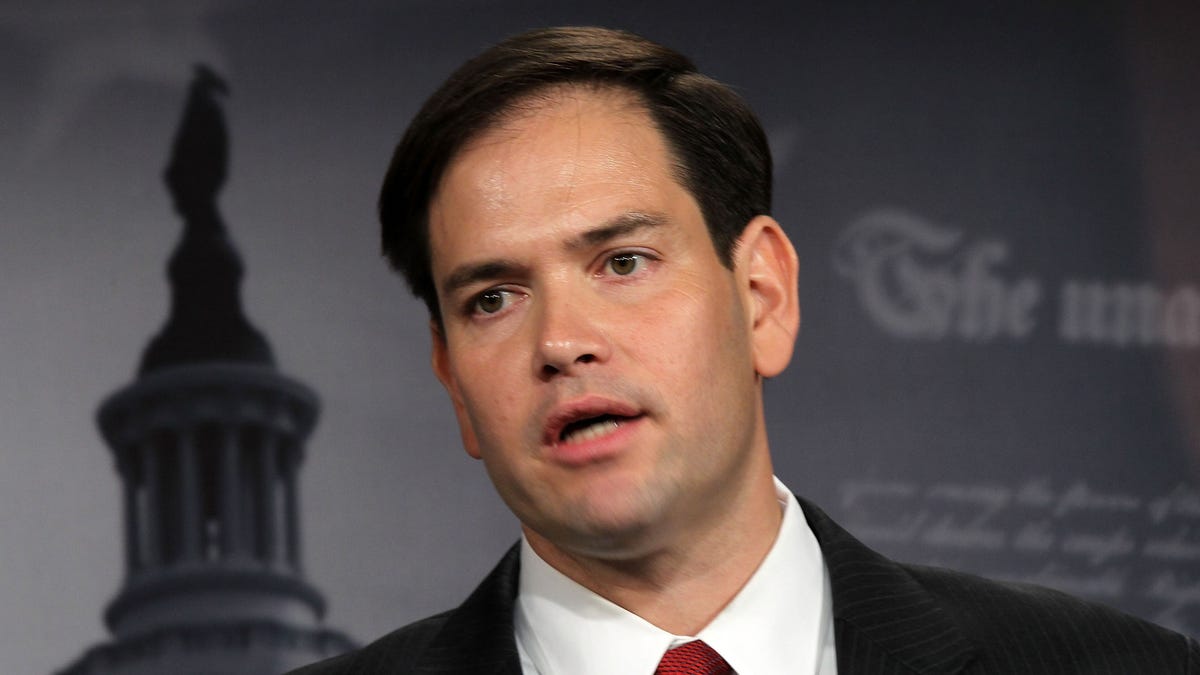
Florida Senator Marco Rubio. (2011 Getty Images)
U.S. Senator Marco Rubio of Florida joined the thousands of websites Wednesday protesting the government’s Protect Intellectual Property Act (PIPA), a bill that legislators claim would help stop Internet copyright infringement but that some online experts warn could restrict the freedom of the Internet.
"I have decided to withdraw my support for the Protect IP Act. Furthermore, I encourage Senator Reid to abandon his plan to rush the bill to the floor," Rubio posted on his Facebook page. "Instead, we should take more time to address the concerns raised by all sides, and come up with new legislation that addresses Internet piracy while protecting free and open access to the Internet."
Rubio's change of heart comes as a bit of surprise as he was co-sponsor of the bill.
The biggest business names participating in the blackout against PIPA and the similar legislation entitled the Stop Online Piracy Act include user-based encyclopedia Wikipedia, web browser Mozilla and photo-sharing site Twitpic.
"For over a decade, we have spent millions of hours building the largest encyclopedia in human history," Wikipedia stated on its website. "Right now, the U.S. Congress is considering legislation that could fatally damage the free and open Internet. For 24 hours, to raise awareness, we are blacking out Wikipedia."
It would be a shame if sites that are rich in Latino content that cater to an underserved community would be forced to shutdown because of such legislation.
Besides those sites going totally dark, search engine giant Google and other sites have put up anti-SOPA content on their website in solidarity with the blackout.
In New York, members of the technology community planned a protest outside the offices of New York Senators Charles Schumer and Kirsten Gillibrand who support the legislation.
"This legislation would give the government and corporations the ability to censor the net in the name of protecting creativity simply by convincing a judge that a site is 'dedicated' to copyright infringement," The New York Tech Meetup’s website stated. "More importantly, the legislation amounts to a wholesale re-engineering of the open web in a way that would allow the US government to prosecute Internet users without due process, which in turn would discourage innovation, limit investment, and hurt our economic future."
Members of the Latino community have also raised concerns about SOPA and its companion legislation the Protect Intellectual Property Act (PIPA), as the bills put websites that link to other sites that have copyright infringements in jeopardy, said Louis Pagan, a social media entrepreneur.
"SOPA limits the free net and puts sites like mine in legal jeopardy if I link to anywhere on the Internet that has copyright infringement. To be forced to police such information is unfathomable," Pagan said to Fox News Latino. "It would be a shame if sites that are rich in Latino content that cater to an under-served community would be forced to shutdown because of such legislation."
Sites like Google and Wikipedia argue that stricter copyright laws would be very difficult to police and could open the companies to an blitz of law suits. Google, YouTube and other sites spend a large amount of time watching their sites for illegally posted, copyrighted material and the two new bills would hold the websites accountable.
Legislators in support of PIPA recently removed a provision that would require Internet service providers to block access to overseas web sites accused of piracy.
"This provision was drafted in response to concerns that law enforcement has remedies it can take against domestic websites, but does not currently have the power to stop foreign rogue website," said Vermont Senator Patrick Leahy. "I regret that law enforcement will not have this remedy available when websites operating overseas are stealing American property, threatening the safety and security of American consumers."
The Obama administration announced earlier this week that it would veto any bill that’s not more narrowly focused. "Any effective legislation should reflect a wide range of stakeholders, including everyone from content creators to the engineers that build and maintain the infrastructure of the Internet," the White House said in a statement. "While we believe that online piracy by foreign websites is a serious problem that requires a serious legislative response, we will not support legislation that reduces freedom of expression, increases cybersecurity risk, or undermines the dynamic, innovative global Internet."
Due to the pressure from online groups as well as the White House, the U.S. House of Representatives has decided to push back a vote on SOPA until February.
Follow Andrew O'Reilly on Twitter: @aoreilly84
Follow us on twitter.com/foxnewslatino
Like us at facebook.com/foxnewslatino







































